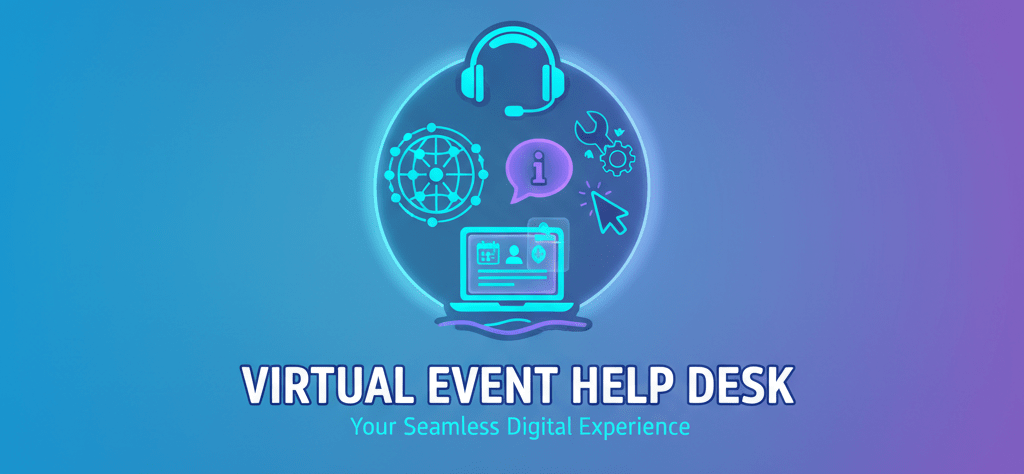“A virtual event help desk built with AI provides instant, 24/7 answers to attendee questions, reducing staff burden and creating a seamless, informed event experience.”
Organizing an event, whether it’s a massive online conference or a bustling in-person summit, brings a unique kind of exhilaration. You’ve poured your heart and soul into crafting an unforgettable experience. The content is stellar. The speakers are captivating. The platform is robust. But then, the floodgates open. Hundreds, even thousands, of attendees descend, each with their own questions, their own needs, their own quest for information.
“What room is the keynote in?”
“When is the networking session?”
“My login isn’t working!”
“Where can I find the speaker’s slides?”
Suddenly, your carefully orchestrated event team transforms into a frantic information dispensary, stretched thin, trying to be everywhere at once. This constant barrage of questions, while completely understandable from an attendee’s perspective, can quickly overwhelm even the most dedicated staff. It detracts from their ability to handle more complex issues or engage in meaningful attendee support. Moreover, delays in getting answers directly impact the attendee experience. Frustration mounts, engagement wanes, and the overall impression of your meticulously planned event can suffer.
Imagine a different scenario. Picture an always-on, always-available assistant, ready to answer every single query, instantly, accurately, and politely. An assistant that doesn’t get tired, doesn’t need breaks, and can handle a thousand simultaneous questions with the same effortless grace. This isn’t a futuristic fantasy; it’s the power of a virtual event help desk powered by an AI agent.
This guide is for you, the event organizer. It doesn’t matter if you’re orchestrating a purely virtual extravaganza, a dynamic in-person gathering, or a complex hybrid event that blends the best of both worlds. The challenge of providing instant, comprehensive information to a large audience remains constant. We’ll explore how an AI agent can become your ultimate 24/7 info booth, transforming your attendee support, easing the burden on your staff, and ultimately, making your event a resounding success.

The Information Avalanche: A Universal Event Challenge
Let’s face it. Events are information-dense environments. Attendees need to navigate schedules, locate sessions, understand platform functionalities, connect with others, and access resources. This is true whether they are physically walking through convention center halls or clicking through virtual lobbies.
In a traditional in-person event, attendees might consult a printed program, look for signposts, or queue up at an information booth. In the virtual realm, they might scour your event website, dig through emails, or try to find a “live chat” button. Each method has its limitations. Printed programs become outdated. Signposts can be missed. Websites require navigation. And live chat, while helpful, often leads to waiting times, especially during peak periods.
The problem escalates with scale. A small workshop with fifty attendees is manageable. A large conference with thousands of participants? That’s an entirely different beast. The sheer volume of incoming questions can quickly swamp your support channels. Your staff, who should be focusing on critical operational tasks, fostering engagement, or handling emergencies, instead spend their time repeating answers to common questions. This isn’t an efficient use of their valuable skills. It also leads to staff burnout and decreased morale.
Consider the diverse needs of your attendees. Some are tech-savvy veterans, others are navigating a virtual platform for the first time. Some are early birds, meticulously planning their day, while others are last-minute joiners, scrambling for information. Their questions range from simple logistical queries (“What’s the Wi-Fi password?”) to more specific content-related questions (“Can you tell me more about Dr. Chen’s session on AI ethics?”). Each question deserves a quick, clear answer.
This is where the traditional approach falls short. Human staff, no matter how dedicated, have limits. They can only handle so many conversations at once. They need breaks. They work within specific hours. An event, however, is often a continuous experience, especially if you have a global audience spanning multiple time zones. Someone in Sydney might be logging on just as your support team in London is winding down for the night. This disparity creates a significant gap in service.
This gap translates directly into a less-than-ideal attendee experience. Imagine an attendee missing a crucial session because they couldn’t quickly find the link. Or a frustrated participant giving up on networking because they couldn’t figure out how to use the platform’s chat feature. These small frustrations accumulate, tarnishing the overall perception of your event. Your event is a brand, and every touchpoint, including how easily attendees can get help, contributes to that brand’s reputation.
Enter the AI Agent: Your Always-On Assistant
So, what’s the solution to this information overload? How do you provide instant, accurate, and scalable support without breaking the bank or overwhelming your team? The answer lies in leveraging the power of an AI agent to create a virtual event help desk.
An AI agent, in this context, is a sophisticated chatbot or conversational AI designed to understand natural language questions and provide relevant, pre-trained answers. Think of it as a highly intelligent, indefatigable member of your support team, but one that can serve thousands of attendees simultaneously, 24 hours a day, 7 days a week.
The magic happens when you “train” this AI agent. You feed it all the essential information about your event. This data becomes its knowledge base, its brain. This training process is critical, and it’s surprisingly straightforward. You load it with:
The complete event schedule: Session times, dates, titles, speakers, room numbers (for in-person), or links (for virtual).
Speaker bios: Who are your presenters? What are their areas of expertise?
Venue maps (for hybrid/in-person): Where are the restrooms? Where’s the main stage? What’s the layout of the exhibition hall?
Platform tutorials (for virtual/hybrid): How do I log in? How do I join a session? How do I use the networking features? How do I access on-demand content?
Frequently Asked Questions (FAQs): All those common questions you anticipate. “Is there Wi-Fi?” “How do I claim my continuing education credits?” “What’s the dress code?” “Where can I find technical support?”
Sponsor information: Details about your valuable sponsors and their offerings.
Exhibitor information: Where are the exhibitor booths located? What companies are participating?
Emergency procedures: What should attendees do in case of an emergency (for in-person)?
Code of Conduct: What are the expected behaviors and guidelines for attendees?
Registration details: How to modify registration, transfer tickets, or access invoices.
Post-event resources: How to access recordings, slides, or certificates after the event concludes.
Networking opportunities: How to connect with other attendees, schedule meetings, or join interest groups.
Accessibility information: Details about accessibility features, closed captions, or special accommodations.
Food and beverage details (for in-person): Meal times, dietary options, and locations of food stations.
Local attractions/transportation (for in-person): Information about nearby hotels, public transport, or parking.
Once trained, the AI agent is ready to deploy. Attendees can access it directly on your event app, through your event website, or even via a dedicated chat widget. When an attendee types a question like, “What room is the keynote in?” the AI agent instantly processes the query, searches its vast knowledge base, and provides the precise answer: “The keynote address by [Speaker Name] is in the Grand Ballroom (Room 301) at 9:00 AM on Monday, [Date].”
This isn’t just about answering questions. It’s about empowering attendees. They get the information they need, precisely when they need it, without delay. This autonomy fosters a sense of control and satisfaction, significantly improving their overall experience.
Beyond Basic Q&A: The Advanced Capabilities
While answering basic questions is a core function, modern AI agents can do much more. They evolve from simple chatbots into intelligent conversational assistants, offering a richer and more dynamic interaction.
Firstly, they handle multilingual support. If your event attracts a global audience, an AI agent can be configured to respond in multiple languages, breaking down communication barriers and making your event truly inclusive. An attendee can ask a question in Spanish and get an answer in Spanish, seamlessly.
Secondly, AI agents excel at personalization. While they provide general event information, they can also be integrated with attendee registration data. This means an AI agent could, for example, answer: “Based on your registration, your personalized agenda includes a session on ‘Advanced Data Analytics’ in Room 205 at 2:00 PM.” This level of tailored information significantly enhances the individual attendee journey.
Thirdly, they offer proactive assistance. Instead of waiting for questions, an AI agent could, for instance, push notifications about an upcoming session relevant to an attendee’s stated interests, or remind them about a networking opportunity. This transforms it from a reactive tool to a proactive engagement mechanism.
Fourthly, AI agents can facilitate feedback collection. After a session, the agent could pop up and ask for quick feedback: “Did you find this session valuable? Please rate it on a scale of 1-5.” This continuous feedback loop provides invaluable data for future event planning. Moreover, it captures insights in real-time, allowing you to gauge attendee sentiment as the event unfolds. You can quickly identify areas of success and pinpoint opportunities for improvement.
Fifthly, they can guide attendees through complex processes. For example, if an attendee needs to troubleshoot a technical issue with the virtual platform, the AI agent can provide step-by-step instructions, complete with links to relevant help articles or video tutorials. This alleviates the burden on your technical support team, allowing them to focus on more intricate problems.
Finally, an AI agent offers a crucial first line of defense for technical support. Many technical issues are simple: a forgotten password, a browser compatibility problem, or a misunderstanding of a feature. The AI agent can resolve these common issues immediately, reducing the number of support tickets that reach your human staff. For more complex problems, the AI can seamlessly escalate the query to a human agent, providing the human with the chat history for context. This “hand-off” capability ensures that attendees always get the help they need, whether from AI or a person.
The Benefits Are Clear: Why You Need an AI Agent
The advantages of implementing an AI agent as your virtual event help desk are compelling and far-reaching. They touch every aspect of your event, from attendee satisfaction to operational efficiency.
1. Unmatched Attendee Experience: This is perhaps the most significant benefit. Attendees get instant answers whenever they need them. No waiting on hold, no searching through endless web pages. This immediacy and accessibility lead to higher satisfaction levels. Attendees feel supported, informed, and valued. They spend less time troubleshooting or seeking information and more time engaging with your content and networking with peers. This positive experience directly correlates with repeat attendance and positive word-of-mouth.
2. 24/7 Availability, Global Reach: Events often transcend geographical boundaries and time zones. An AI agent is always on, ready to assist attendees regardless of when or where they log in. This ensures consistent support for a global audience, eliminating frustrating delays that can occur due to differing work hours. It means an attendee in Tokyo can get immediate help at 3 AM their time, even if your event staff is based in New York and asleep.
3. Reduced Burden on Event Staff: This is a game-changer for your team. By handling the vast majority of routine and repetitive questions, the AI agent frees up your human staff. They can then focus on higher-value tasks: resolving complex issues, providing personalized assistance, actively engaging with attendees, managing speakers, or addressing unforeseen challenges. This prevents burnout and allows your team to operate more strategically and effectively. Imagine your staff actually having time to mingle with attendees, rather than just pointing them to the right room.
4. Scalability Without Limits: Whether you have 100 attendees or 10,000, an AI agent handles the load with ease. It doesn’t get overwhelmed. You don’t need to hire additional staff for larger events to manage the influx of questions. This makes it an incredibly cost-effective solution for growing events. The infrastructure simply scales to meet demand without requiring increased human resources.
5. Consistent and Accurate Information: Humans, even the most well-meaning, can make mistakes. They might misremember a session time or provide slightly different answers to the same question. An AI agent, however, draws from a single, centralized knowledge base. This ensures that every attendee receives the exact same, accurate information every single time. Consistency builds trust and reduces confusion.
6. Data Insights for Future Events: Every interaction with your AI agent is a data point. What questions are asked most frequently? What information are attendees struggling to find? This invaluable data provides deep insights into attendees’ needs and pain points. You can use this information to refine your event content, improve your communication strategies, and optimize your event platform for future iterations. It’s like having a constant focus group providing feedback on your event’s usability and clarity.
7. Cost-Effectiveness: Hiring and training a large team of human support staff, especially for temporary event roles, can be expensive. An AI agent offers a highly cost-effective alternative, delivering round-the-clock support at a fraction of the cost. Over time, the return on investment becomes significant. You save on wages, training, and logistical overhead.
8. Enhanced Professionalism: A well-implemented AI help desk projects an image of a modern, well-organized, and attendee-focused event. It demonstrates your commitment to providing a seamless experience, enhancing your brand’s reputation and professionalism. It shows you’ve thought about every detail, from content to support.
Scalewise.ai: Your Partner in Building a Seamless Event Experience
You’ve learned about the immense benefits of an AI-powered virtual event help desk. Now, let’s talk about the tool that makes this vision a reality: Scalewise.ai.
Scalewise.ai is the perfect solution for event organizers looking to dramatically improve their attendee experience and streamline their support operations. Why? It’s a free, no-code AI Agent Builder that empowers anyone, regardless of their technical background, to quickly and easily build and deploy a helpful AI assistant.
Here’s why Scalewise.ai stands out:
No-Code Simplicity: Forget about complex programming or hiring expensive AI specialists. Scalewise.ai’s intuitive interface lets you train your AI agent by simply uploading your event documents and content. If you can organize your event schedule and FAQs, you can build an AI agent with Scalewise.ai. This democratizes AI, making it accessible to every event organizer.
Rapid Deployment: Time is always a critical factor in event planning. Scalewise.ai allows you to build and deploy your virtual help desk in a matter of hours, not weeks or months. This means you can quickly react to planning changes and have your support system ready well in advance of your event.
Comprehensive Knowledge Base: Train your AI agent on all your critical event information: session schedules, speaker bios, venue specifics, FAQs, platform guides, networking instructions, and more. The more data you provide, the smarter and more helpful your agent becomes. You can upload documents in various formats, making the data ingestion process smooth and flexible.
24/7 Attendee Support: Once deployed, your Scalewise.ai agent acts as an always-on information booth. Attendees get instant answers to their questions, around the clock, improving satisfaction and reducing frustration. This constant availability ensures no question goes unanswered, regardless of time zone or attendee volume.
Seamless Integration: Scalewise.ai agents can be easily embedded directly into your event website or event app with a simple copy-paste of a code snippet. It appears as a friendly chat widget, familiar to users and easy to interact with. This seamless integration ensures your help desk is readily available where attendees expect it.
Scalability for Any Event Size: Whether you’re hosting a small regional meetup or a massive international summit, Scalewise.ai scales effortlessly. It handles hundreds or thousands of simultaneous queries without missing a beat, ensuring consistent performance even during peak event times.
Reduced Staff Burden: By automating answers to common questions, Scalewise.ai frees your event staff from repetitive tasks. They can then focus their valuable time and expertise on engaging with attendees, resolving complex issues, and ensuring the smooth execution of the event. This enhances team efficiency and job satisfaction.
Improve Attendee Experience: Ultimately, a well-informed attendee is a happy attendee. Scalewise.ai helps create a smooth, self-sufficient experience, allowing participants to maximize their engagement with your content and networking opportunities. This positive experience leaves a lasting impression and encourages future participation.
Post-Event Feedback Collection: Your Scalewise.ai agent can also assist in gathering valuable feedback. Configure it to ask for session ratings, general event satisfaction, or specific suggestions, providing you with actionable insights for your next event. This continuous improvement loop is vital for long-term success.
Stop imagining a better way to support your event attendees. Start building it. Scalewise.ai offers a powerful, accessible, and free solution to transform your event support, delight your attendees, and empower your team.
Don’t let information overload hinder your next event’s success. Embrace the future of event support. Build your 24/7 virtual event help desk with Scalewise.ai today.
Building Your AI-Powered Help Desk: It’s Easier Than You Think
The idea of building an AI agent might sound daunting. Many organizers might imagine complex coding, data scientists, and a massive budget. This is where modern AI agent builders completely change the game.
The good news is that creating a powerful, effective virtual event help desk no longer requires a team of developers or extensive AI expertise. Today, there are intuitive, no-code platforms designed specifically to empower event organizers like you.
The process typically involves these straightforward steps:
1. Gather Your Event Information: This is the most crucial step. Compile all the details we discussed earlier: schedules, speaker bios, FAQs, platform instructions, venue maps, sponsor info, etc. Organize it clearly, perhaps in documents, spreadsheets, or even just well-structured text files. The more comprehensive and accurate this data is, the more intelligent your AI agent will be. Think of yourself as building the ultimate event encyclopedia.
2. Choose a No-Code AI Agent Builder: This is where you select the tool that will bring your AI to life. Look for platforms that emphasize ease of use, robust features, and scalability. You want something that allows you to “train” the AI simply by uploading your compiled event information.
3. Upload and Train Your AI Agent: With your chosen platform, you’ll upload your event documents. The AI agent builder will then process this information, learning the nuances of your event data. This “training” phase is largely automated. You simply provide the content, and the AI learns from it. It will identify key entities, relationships, and common question patterns within your data.
4. Test and Refine: Once the AI is trained, you’ll thoroughly test it. Ask every question you can think of, just as an attendee would. “When is lunch?” “Who is Dr. Anya Sharma?” “How do I access the exhibit hall?” Pay close attention to its answers. If it struggles with a particular type of question, you can easily add more specific information to its knowledge base or refine existing entries. This iterative process of testing and refining ensures accuracy and comprehensiveness. This stage is crucial for identifying any gaps in information or areas where the AI’s understanding needs improvement.
5. Deploy Your Virtual Help Desk: Once you’re satisfied with your AI agent’s performance, it’s time to deploy it. Most platforms offer simple ways to embed the AI agent onto your event website, integrate it into your event app, or provide a direct link for attendees to access. It often appears as a chat widget in the corner of the screen, familiar and easy for users to engage with.
The beauty of these no-code solutions is that they demystify AI. They put powerful technology directly into the hands of event organizers, allowing you to create a sophisticated support system without needing to write a single line of code. You focus on the content and the attendee experience; the tool handles the AI complexity.
FAQs: Common Questions About AI Event Support
Q: Will an AI agent replace my human staff?
A: No, an AI agent complements your human staff; it does not replace them. It handles the repetitive, high-volume, and frequently asked questions. This frees up your human team to focus on complex inquiries, personal interactions, networking facilitation, and managing critical event logistics. Think of it as empowering your team to do more impactful work.
Q: How accurate are AI agents?
A: An AI agent’s accuracy directly depends on the quality and comprehensiveness of the data you feed it. If you provide clear, up-to-date, and detailed event information, the AI will provide highly accurate answers. Regular testing and refinement before and during the event ensure top-tier performance.
Q: What if an attendee asks something the AI doesn’t know?
A: A well-designed AI agent knows its limits. If it encounters a question outside its trained knowledge base, it won’t just give a wrong answer. Instead, it will typically offer to:
Search its knowledge base for similar topics.
Direct the attendee to a general FAQ section.
Seamlessly hand over the conversation to a human support agent, providing the human with the full chat history for context. This ensures the attendee always gets help.
Q: Is it difficult to keep the AI agent’s information updated?
A: No, it’s designed for easy updates. As event details change (e.g., a speaker time shift, a new session added), you can quickly update the AI’s knowledge base through the platform’s intuitive interface. The changes are usually reflected almost instantly, ensuring your help desk always has the latest information.
Q: Can an AI agent handle technical support issues?
A: Yes, to a significant extent. For common technical issues like login problems, audio/video troubleshooting, or navigating the event platform, the AI can provide step-by-step guidance. For more complex, unique technical glitches, it can efficiently escalate the issue to your human technical support team.
Q: How long does it take to set up an AI help desk?
A: With a no-code platform, setup time can be surprisingly fast. The primary time investment is in gathering and organizing your event information. Once that’s ready, building and training the AI agent can take just a few hours to a couple of days, depending on the complexity of your event and the volume of data. Deployment is usually a matter of minutes.
Q: Can an AI agent integrate with my existing event platform?
A: Most modern AI agent builders offer various integration options. They can often be embedded directly into your event website or app using a simple code snippet (like a chatbot widget), or connect via APIs to more complex platforms. Check with your chosen AI agent builder and event platform providers for specific integration capabilities.
Q: Is an AI help desk suitable for hybrid events?
A: Absolutely! Hybrid events present a unique challenge, serving both in-person and virtual attendees. An AI agent is perfect for this, providing consistent information whether an attendee is asking “What’s the best route to the main hall?” or “How do I join the virtual breakout room?” It unifies the support experience across both environments.
Q: What about data privacy and security?
A: Reputable AI agent builders prioritize data privacy and security. They adhere to industry standards and regulations (like GDPR and CCPA). When choosing a platform, inquire about its data handling policies, encryption methods, and compliance certifications. Ensure they explain how attendee data is stored and protected.
Q: Can the AI agent collect feedback after sessions?
A: Yes, many AI agents can be configured to prompt attendees for feedback after sessions or at specific points during the event. This helps you gather valuable insights on content, speakers, and overall event satisfaction in real-time. This can be as simple as asking for a rating or offering a short survey.





